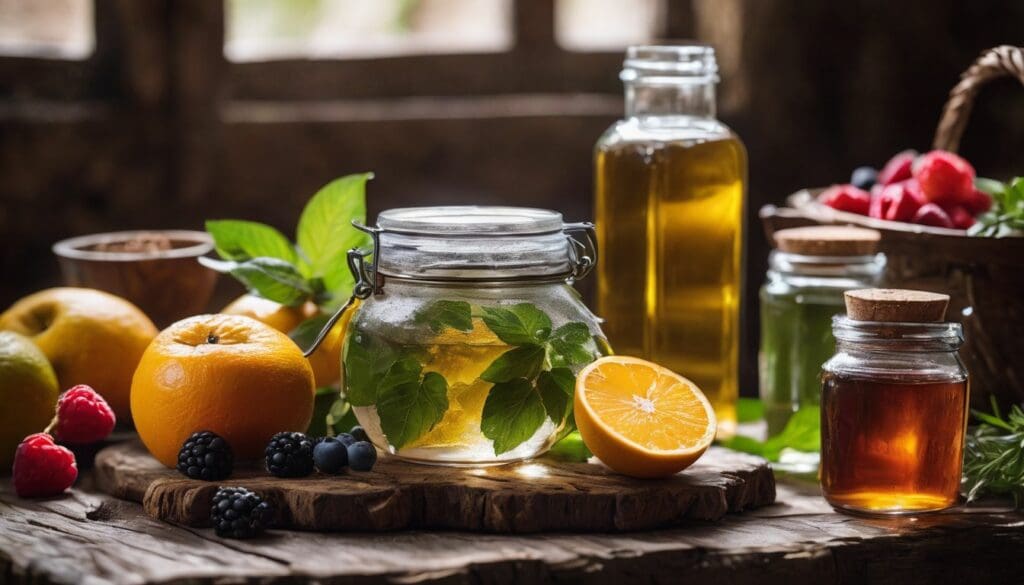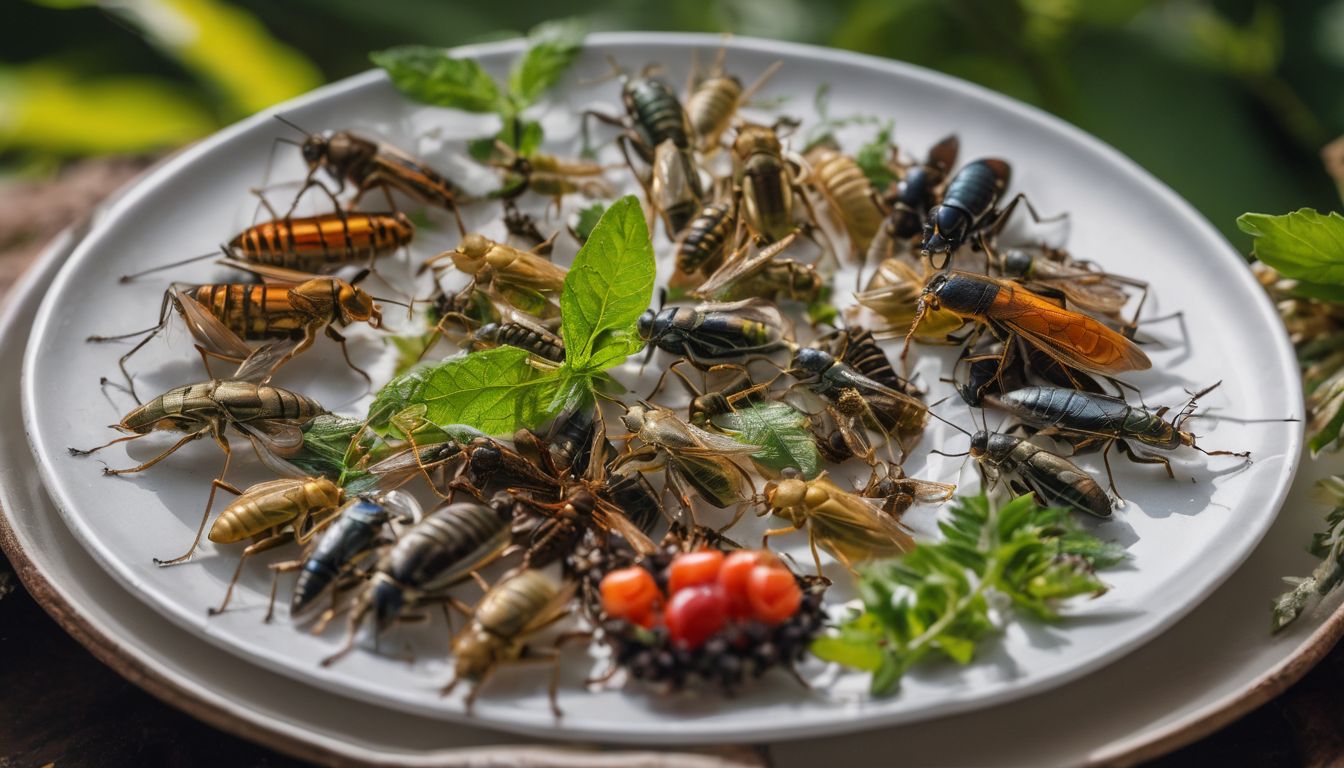Cutting down on sugar can be a tough nut to crack. Many natural sweeteners offer sweetness without the health drawbacks of refined sugar. This article will guide you through the world of natural sweeteners, showing how they can benefit your diet and lifestyle.
Stay sweet, keep reading!
Key Takeaways
- Natural sweeteners like stevia, monk fruit extract, and erythritol offer zero – calorie alternatives to sugar, helping those looking to manage their calorie intake or blood sugar levels.
- Traditional natural sweeteners such as honey and maple syrup have been used for centuries and provide antioxidants along with a unique depth of flavour in cooking and baking.
- Using natural sweeteners can contribute to environmental sustainability by supporting bee populations with honey production or reducing processing through plant-based options like stevia.
- While natural sweeteners offer health benefits, they may have potential side effects; for example, some individuals might experience digestive issues from certain substitutes like stevia or erythritol.
- Substituting refined sugars with natural sweeteners in holiday recipes is a healthier choice that doesn’t compromise taste while also providing essential nutrients and lowering glycaemic index.
What Are Natural Sweeteners?
Natural sweeteners are organic alternatives to traditional sugar, derived from plants like stevia, monk fruit, and honey. They offer a healthier option for those looking to reduce their intake of refined sugars and artificial sweeteners.
Definition
Natural sweeteners offer a way to sweeten foods without using refined sugar. They come from nature and are less processed than artificial sweeteners or high-fructose corn syrup. These alternatives include extracts from plants, like stevia and monk fruit, as well as products harvested directly such as honey and maple syrup.
People often choose them for their possible health benefits and lower calorie content compared to regular sugar.
Opting for these organic sweeteners can be part of a lifestyle that prioritises environmental conservation. Sweetening agents derived from natural sources may have a smaller ecological footprint, aligning with the values of those mindful about sustainability.
Moving on, let’s delve into the various types available in this category of healthy baking ingredients.
Types (stevia, monk fruit, honey, etc.)
Natural sweeteners come in various forms, offering healthier alternatives to refined sugar. These options include:
- Stevia: A plant-based sweetener known for its zero-calorie content, making it a popular choice amongst those looking to reduce their sugar intake.
- Monk Fruit: This low-calorie sweetener is derived from the monk fruit and is valued for its intense sweetness without the bitter aftertaste often associated with other sugar substitutes.
- Honey: A natural sweetener with potential health benefits such as antioxidant properties and soothing effects on sore throats.
- Maple Syrup: Extracted from the sap of maple trees, it offers a unique taste and is often used as a substitute for traditional sugars in cooking and baking.
- Date Paste: Made by blending dates with water, it serves as a natural sweetener rich in fibre and essential nutrients.
The Benefits of Using Natural Sweeteners
Using natural sweeteners like stevia, monk fruit, or honey can provide nutritional benefits without the added calories and potential side effects of traditional sugar. These alternatives offer a healthier option for those looking to reduce their sugar intake.
Nutritional benefits
Natural sweeteners are packed with nutritional benefits, making them a healthier alternative to refined sugar. Here are the key nutritional benefits of using natural sweeteners:
- Plant-based nutrients: Natural sweeteners like honey and maple syrup contain essential vitamins and minerals, including B vitamins, iron, and antioxidants.
- Lower glycemic index: Many natural sweeteners have a lower impact on blood sugar levels compared to refined sugar, making them suitable for individuals monitoring their blood glucose levels.
- Fewer calories: Some natural sweeteners, such as stevia and monk fruit extract, are low in calories, offering a sweet taste without the added calories found in traditional sugars.
- Digestive health: Certain natural sweeteners like erythritol and date paste are known for being more gut-friendly than traditional sugars, supporting digestive well-being.
- Anti-inflammatory properties: Maple syrup and honey contain compounds that have anti-inflammatory effects, contributing to overall health benefits when consumed in moderation.
- Overall well-being: Using natural sweeteners allows individuals to enjoy the sweetness of foods while reducing their intake of refined sugars and artificial additives, promoting a healthier lifestyle.
Potential side effects
After understanding the nutritional benefits of natural sweeteners, it’s important to also be aware of their potential side effects. Here are some things to keep in mind when using natural sweeteners:
- Stevia: Some people may experience digestive issues such as bloating or gas when consuming stevia in large amounts.
- Monk fruit extract: Although rare, some individuals may be sensitive to monk fruit extract and experience allergic reactions.
- Erythritol: Excessive consumption of erythritol may lead to stomach upset or diarrhea for some people.
- Honey: Consumption of raw honey can pose a risk of botulism poisoning in infants under one year old due to the presence of certain bacteria.
- Maple syrup: Individuals with diabetes should monitor their blood sugar levels when using maple syrup as it still contains significant amounts of sugar.
Substituting Natural Sweeteners in Holiday Recipes
Discover healthier holiday options by learning tips for baking with natural sweeteners and incorporating them into your favorite festive recipes.
Tips for baking with natural sweeteners
When using natural sweeteners in baking, it’s essential to start with small amounts and adjust to taste.
- Experiment with different types of natural sweeteners to find the right balance of sweetness for your recipes.
- Reduce the amount of liquid in a recipe when using liquid sweeteners like honey or maple syrup.
- Keep in mind that natural sweeteners may cause baked goods to brown more quickly, so it’s important to monitor them closely while baking.
- When substituting natural sweeteners for sugar, consider the impact on texture and moisture levels in your baked goods.
- Explore recipes specifically designed for natural sweeteners to ensure successful results.
Healthier holiday options
After learning about tips for baking with natural sweeteners, environmentally conscious individuals seeking healthier holiday options can consider these alternatives for sweetening festive treats.
- Swap traditional sugar for natural sweeteners like stevia, monk fruit extract, or erythritol to reduce the overall sugar content in holiday recipes.
- Experiment with using honey or maple syrup as a natural and unrefined sweetening option, adding depth of flavour to dishes while supporting sustainable practices.
- Consider using date paste or coconut sugar to add natural sweetness along with essential nutrients and minerals to holiday desserts.
- Explore the use of sugar alcohol alternatives such as xylitol or sorbitol for a lower – calorie option without compromising on taste.
- Incorporate plant-based sweeteners like agave nectar as an eco-friendly and ethical alternative to processed sugars in holiday baking.
Popular Natural Sweeteners
Learn about popular natural sweeteners including stevia, monk fruit extract, erythritol, honey, maple syrup and date paste. These alternative sweeteners provide a healthier option for those looking to cut back on refined sugars.
Stevia
Stevia is a natural sweetener derived from the leaves of the Stevia rebaudiana plant. It is a popular sugar substitute due to its zero-calorie content and low impact on blood sugar levels, making it an excellent choice for those looking to reduce their caloric intake or manage diabetes.
Stevia also has antioxidant properties, which may have potential health benefits, such as lowering inflammation in the body. As one of the non-nutritive sweeteners, stevia can be used in place of sugar in various recipes and beverages without adding extra calories.
In addition to being calorie-free, stevia is significantly sweeter than table sugar, so only a small amount is needed to achieve the desired level of sweetness. This aspect makes it an attractive option for those seeking natural alternatives to artificial sweeteners.
Monk fruit extract
Monk fruit extract, also known as luo han guo, is a natural sweetener derived from the monk fruit. It is 150-200 times sweeter than sugar and contains zero calories, making it an excellent low-calorie sweetening option for those looking to reduce their sugar intake.
Monk fruit extract can be used in baking and cooking as a sugar substitute, adding sweetness without the extra calories or carbohydrates. This plant-based sweetener has gained popularity due to its non-artificial nature and health benefits, making it a suitable choice for environmentally conscious individuals seeking healthier sweetening alternatives.
With its natural origin and zero-calorie content, monk fruit extract offers a healthy alternative to traditional sugars while contributing to environmental conservation efforts through sustainable choices.
Erythritol
Erythritol is a natural sweetener that occurs in small amounts in fruits such as pears, watermelon, and grapes. It is also commercially produced from the fermentation of glucose by certain yeasts.
Erythritol contains zero calories and does not affect blood sugar levels, making it a suitable option for those seeking to reduce their calorie intake or manage diabetes. Additionally, it has no impact on dental health and does not contribute to tooth decay, making it an attractive alternative to regular sugar for oral health-conscious individuals.
Erythritol serves as an effective substitute for sugar in baking and cooking due to its similarity in taste and texture. As part of the popular group of natural sweeteners, erythritol offers a low-calorie solution without compromising on sweetness.
Honey
Transitioning from erythritol, let’s explore the natural sweetener – honey. Honey has been used for centuries as a natural sweetener and is rich in antioxidants and beneficial plant compounds.
It offers potential health benefits such as soothing sore throats, improving digestive health, and providing relief for coughs. As a sugar substitute, honey can be added to various recipes to enhance flavor while providing essential nutrients.
Honey serves not only as a sweetening agent but also contributes to environmental sustainability by supporting bee populations and promoting biodiversity. This natural sweetener holds cultural significance in many societies and continues to be a popular choice for those seeking healthier alternatives to refined sugars.
Maple syrup
Transitioning from the natural sweetness of honey, let’s explore another popular natural sweetener – maple syrup. Maple syrup is a traditional and beloved sweetener derived from the sap of sugar maple trees.
This natural sweetener is rich in antioxidants and provides essential minerals like manganese and zinc, making it a healthier alternative to refined sugars. Its delightful flavour adds depth to both sweet and savoury dishes, making it a versatile ingredient for environmentally conscious individuals looking for more sustainable sugar alternatives.
Maple syrup has been used as a sweetening agent for centuries, with Indigenous Peoples in North America being the first to harvest and use this delectable nectar. The process of tapping trees to gather sap remains largely unchanged over time, preserving tradition while providing a delicious natural option for those seeking healthier lifestyle choices.
Date paste
Date paste is a natural sweetener made from pureed dates. It offers a rich and caramel-like sweetness, perfect for adding depth of flavour to your favourite recipes. Date paste is not only a healthier alternative to refined sugar but also provides essential nutrients like fiber, potassium, and antioxidants.
This versatile sweetener can be used in baking, smoothies, salad dressings, and marinades, making it an excellent choice for those looking to reduce their consumption of processed sugars.
For environmentally conscious individuals seeking natural sugar alternatives, date paste offers a sustainable option that supports conservation efforts by promoting the use of whole foods as sweeteners.
Coconut sugar
Transitioning from the natural sweetness of date paste, coconut sugar provides another healthier alternative to traditional sweeteners. Extracted from the sap of coconut palm trees, coconut sugar is unrefined and has a lower glycemic index than regular sugar, making it a popular choice for those seeking healthier sweetening options.
With its caramel-like flavor and rich mineral content, coconut sugar has gained traction as a plant-based sweetener in various culinary applications.
Used as a 1:1 replacement for white or brown sugar in recipes, coconut sugar offers an easy transition into low-calorie and non-artificial sweetening. Its sustainable production aligns with conservation values while providing a natural sugar substitute that supports environmentally conscious choices in dietary habits.
Exploring the History and Use of Natural Sweeteners
Delve into the rich history of traditional sweeteners like honey, molasses, sorghum, and maple syrup and discover their benefits in modern cooking. Intrigued? Keep reading to uncover more about these natural sweeteners.
History of honey, molasses, sorghum, and maple syrup
Honey has been used for its sweetness and medicinal properties since ancient times. The practice of beekeeping to harvest honey dates back thousands of years, with evidence found in cave paintings and archaeological digs.
Molasses, a byproduct of the sugar refining process, has a rich history as a sweetening agent in various cuisines around the world. Sorghum syrup holds significance as a traditional sweetener in the southern United States and is derived from sorghum cane plants.
Maple syrup, predominantly produced in North America, traces its roots back to Indigenous peoples who were the first to tap maple trees for their sap.
Benefits of using these traditional sweeteners
- Rich in nutrients and antioxidants, such as vitamins, minerals, and polyphenols
- Lower glycaemic index compared to refined sugars, helping to regulate blood sugar levels
- Molasses: High in iron, potassium, and calcium
- Sorghum: Packed with essential nutrients like iron and B vitamins
- Maple syrup: Contains manganese, zinc, and antioxidants
- Support for sustainable agriculture and local economies
- Honey: Supports bee populations and helps maintain biodiversity
- Sorghum: Thrives in diverse climates and enriches soil health
Conclusion
In conclusion, natural sweeteners are a healthier alternative to refined sugars. They offer various nutritional benefits and can be used in holiday recipes for a healthier twist. Exploring the world of natural sweeteners provides insight into traditional and modern options for those seeking healthier, plant-based sweetening alternatives.
Making the switch to natural sweeteners not only benefits personal health but also supports environmental conservation efforts.
FAQs
1. What are natural sweeteners?
Natural sweeteners are sugar substitutes that come from plants and offer a healthier, low-calorie way to add sweetness to food and drinks without using artificial ingredients.
2. Can natural sweeteners be considered healthy?
Yes, many consider plant-based, non-nutritive natural sweeteners as healthy alternatives because they often have lower calories compared to regular sugar.
3. Are all natural sweeteners low in calories?
While not all natural sugar substitutes are low in calorie, several plant-based options provide sweetness with fewer calories than traditional sugar.
4. Do natural sweeteners taste like real sugar?
Some non-artificial sweeteners do closely mimic the taste of real sugar, offering a similar flavour profile while being a healthier, sugar-free option.





